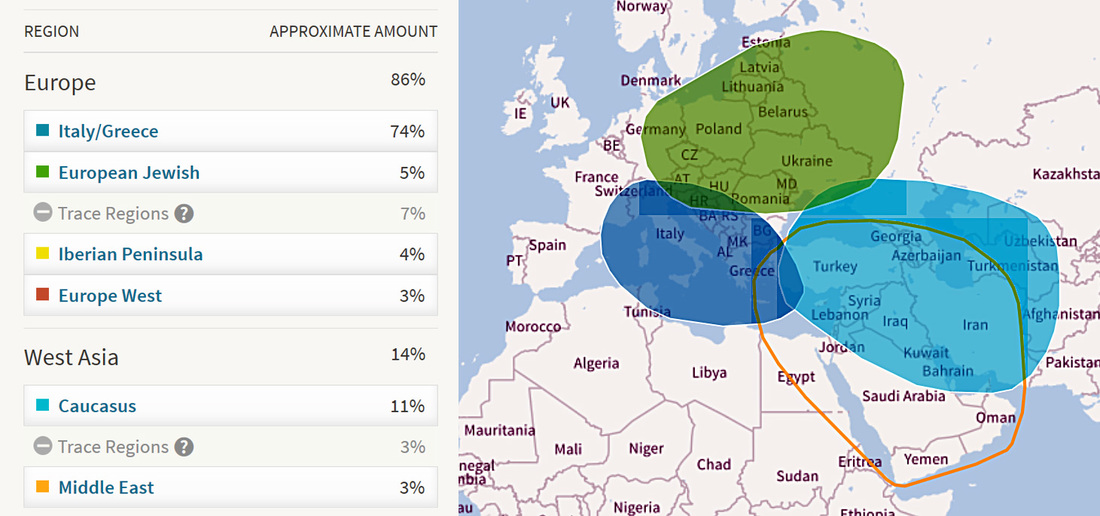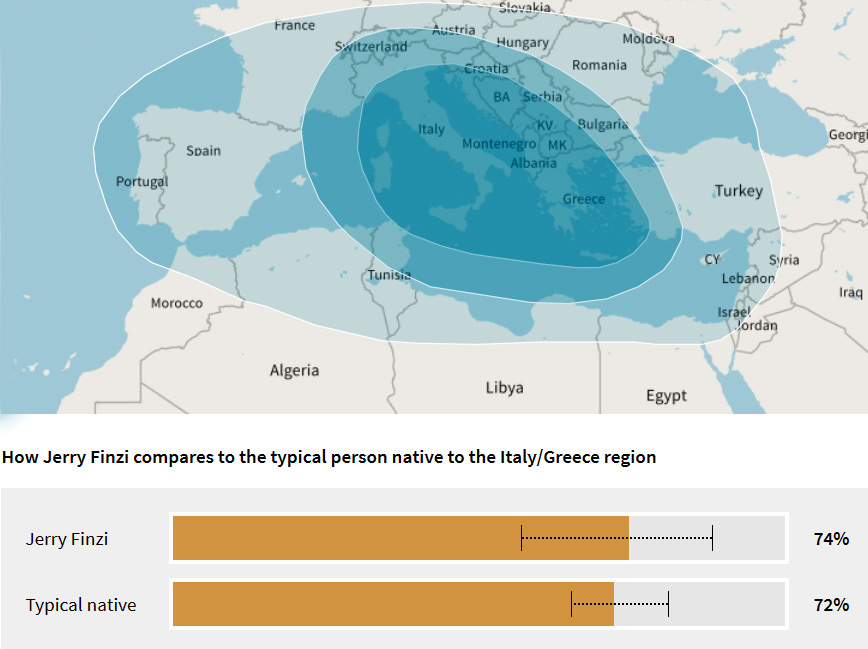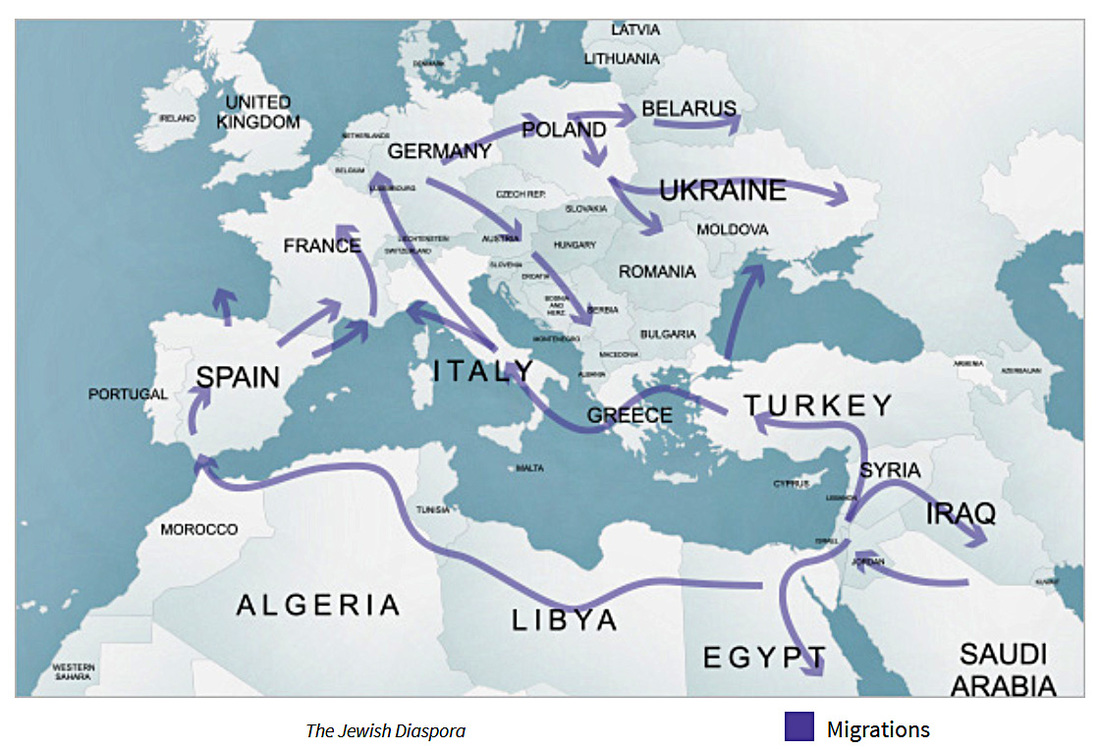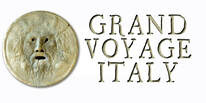|
My wife, Lisa bought me an interesting birthday gift this year--a DNA test kit. I've been researching my Italian heritage since before we took our voyage to Italy late 2014. The origins of the Finzi family name have fascinated me since I was a kid. It was such an unusual name... unlike most Italian names, aside from an "i" at the end. To my ears it sounded Ancient Roman. I could imagine it engraved in marble somewhere in the ancient world. As I grew through life I had hints of the roots of the Finzi famiglia: The film Garden of the Finzi-Contini about a Jewish family during Nazi occupation; a large department store named Finzi in Geneva (also Jewish); the British, Jewish composer Gerald Finzi (I was also baptized Gerald); but then I was thrown off by the Finzi Rum made in Jamaica (how did a Finzi get way down there?) Suspecting a Jewish connection, I started reading about the history of the Jews as they moved throughout the world and through history in what is called the Diaspora--the often forced movement of Jews from one land to another. They originated in the Middle East, then moved to Greece and Southern Italy (called Magna Graecia) then to Northern Italy, Austria, Germany, Poland, Western Europe, Spain and beyond. I read how the ancient form of our family name was varied: Pinchas, or in Latin as, Finees or Finea. I learned that the Finzi lineage leads back to ancient times—2000 years ago and perhaps further. Many—and semingly most—modern Finzis living today are Jewish. Roman Catholic Finzis are in much smaller numbers. I have come to a theory on the reason for this... At several times in history, many Jewish bearers of the Finzi name were forced to either to give up their religion entirely, convert to Catholicism (often under threat of death), or to leave their current homeland and relocate to other lands if they wanted to continue in their Jewish faith. This caused a split in the Finzi family lineage--most being Jewish, and some Catholic—like my family. When my line of Finzis converted to Catholicism isn't certain, but there are a few possibilities. The first goes back almost 2000 years... More likely than not, the first Jews (including Finzis) arrived in Puglia in southern Italy (perhaps after first migrating to Greece) sometime after the destruction of the Second Temple in Jerusalem in 70 AD. At the time, Emperor Tito brought back 5000 prisoners who settled in and around Taranto. In addition, the ports of Brindisi, Otranto, Bari, Trani and Barletta were the natural ports of entry from the Middle East, with the whole of Puglia becoming the first new community for the dispora of Jews looking for a new life in Italy and Western Europe. OK, so that's how the first Jewish Finzis probably arrived in Italy. As time went on, more and more Jews came to Puglia, but not all from Palestine. Some arrived by sea from the Balkans, others from Spain and Portugal, France, Central Europe and even other parts of Italy. Once in Puglia, they assimilated with existing groups, creating a Judaism with its own unique profile. Many spoke Greek as their first language. Still today, there are Jewish communities and a strong historic record of Jews in Puglia, such as Jewish tombstones from the third century A.D..
But why and when did my line of Finzis convert from Judaism to Catholicism? There are three possibilities:
Jews who were forced to convert were called either neofiti, cristiano novi or cristiani novelli. Converting to Christianity didn’t mean they had as many rights as others who were born as Christians. When Jews converted, they were expected to condemn their former religion in the harshest way possible, making it difficult for them to re-enter at a later time. Most neofiti were not permitted to own land. And in Christian communities, these Jewish apostates were not considered full-fledged Christians. Cristiani novella were caught in the middle of the two faiths. Perhaps this was the fate of my lineage of the Finzi famiglia so long ago... I'm strongly convinced now that my family line was forced to convert perhaps as much as a thousand years ago. The DNA results give strong evidence for that, especially since the percentage of "Italy/Greece" DNA is very high at 74%, while the "European Jewish" (5%) and "Middle East" (3%) DNA are surprisingly low. To be honest, I was expecting a higher percentage of Jewish DNA in my blood, either European Jewish or Middle Eastern. From what I read about the DNA science behind the results, such a large percentage of "Italian/Greece" DNA with such a low percentage of Jewish DNA means that the Jewish part of my lineage was long ago in history. The amazing thing to me is that 74% is actually higher than a native of the "Italy/Greece" region! Does this mean I'm more Italian than Italians? --Jerry Finzi
17 Comments
Jennifer Andersen
8/1/2018 11:39:59 pm
Yes. That means you're more Italian than most Italians, and you're less Jewish than all Jews. :)
Reply
Jerry Finzi
8/2/2018 09:51:43 am
Jennifer,
Reply
Claudio
10/8/2018 06:12:49 am
Jerry Finzi.
Dominic Delfino
9/17/2018 12:31:31 pm
I got my Ancestry DNA results today. Italy 92%. Greece 4%. Turkey 4%. Seems Ancestry is now separating Italy/Greece or I would have 96%
Reply
Jerry F
9/17/2018 03:42:31 pm
Dominic,
Reply
Jerry
10/8/2018 01:05:31 pm
Dominic,
Reply
Claudio
10/8/2018 03:39:32 pm
86% Italian
Reply
10/9/2018 07:48:57 pm
I think I am a gypsy at heart having so many different estimates ;)
Reply
Chris
1/16/2021 03:19:56 am
Italian and Greek Jews were Pre-Ashkenazi so the Ashkenazi markers in many Greek/Italian Jews are not evident in genetic testing
Reply
kaniel outis
1/25/2021 12:46:13 am
I took a test with Living DNA. They don't have an Ashkenazi marker, so I score a mix of Southern European and Near Eastern with a small percentage of Eastern European (Northeast Europe). Ashkenazim who test with Living DNA always score Italian, whether it be Southern Italy, Tuscany, or Northern Italy, or all of the above due to reasons you outlined above. Behar has done extensive studies on Ashkenazi autosomal DNA and has found that they cluster with Italians.
Reply
Kaniel Outis
1/28/2021 02:30:29 am
You are possibly more Jewish than what you think. Behar points out that Ashkenazim cluster close to South Caucasian people, such as Armenians. I did my test with living DNA, who don't have an Ashkenazi marker, and like other Ashkenazim, I score South Caucasus. You also get a small percentage of Middle Eastern. Ashkenazim and Sephardim cluster with Middle Eastern groups. I score Arabian, which includes Saudi Arabia, Yemen, Iraq, UAE, Qatar, Oman, Bahrain, and Kuwait. Many other Ashkenazim also score Arabian. You could have Sephardic and Ashkenazic ancestry.
Reply
Claudio
12/29/2022 11:04:08 am
I wouldn’t take your LivingDNA results to seriously.
Reply
Alfio
9/21/2021 06:19:29 pm
You are not more Italian than an Italian, yours are just S.Italian\like results. Possibly that Italian\Greek label represents some dna samples from South Italy. In many tests "Italian" is represented by Tuscans so you would get a lot less in that case.
Reply
JoeM
12/13/2022 09:36:20 pm
I didn't find the Jewish thing interesting. There is this obsession about Jewish ancestry, also Romani, which I don't share.
Reply
Claudio
12/29/2022 10:55:56 am
Jerry’s AncestryDNA results should have updated drastically since they now have a North Italian,a South Italian,and a Mainland Greek, and Aegean Greek Islands Catergory, as well as Cypriot - Grace us with your updated results Mr Finzi! ;)
Reply
Stefania
5/5/2024 04:51:52 am
To us former Italian schoolkids, Finzi is an eminently Jewish surname. This is due to "Il giardino dei Finzi Contini" (The garden of the Finzi Contini's) by Giorgio Bassani, a 1962 novel set in 1930s Ferrara, Northern Italy. In the novel, the Finzi Contini are an affluent Jewish family shattered by anti-Jewish laws in Fascist Italy. This is seen through the eyes of the main character, a (Gatsby-like) school kid who frequents the house and falls in love with the family's daughter. The book was later adapted into a film by the famous director Vittorio De Sica. https://en.wikipedia.org/wiki/The_Garden_of_the_Finzi-Continis_(film)
Reply
Jerry F.
5/6/2024 04:45:30 pm
As I wrote in this article, my original theory of my own Finzi name (from a Catholic family in Molfetta, Puglia) was that in times past during periods of pressure upon Italian Jews, my ancestors were forced to convert to Christianity. I have since learned from elders in Molfetta that my great-great grandfather, Anselmo Finzi was abandoned and somehow assigned the surname Finzi at birth in 1847--supposedly the parents were a Noble (Fontana) and a servant girl from Giovinazza. (I have since traced his mother via DNA and local church records, which showed Anselo as a teen living with her family after he left the Ginovinazzo orphanage).
Reply
Your comment will be posted after it is approved.
Leave a Reply. |
Categories
All
Archive
June 2024
|





 RSS Feed
RSS Feed
